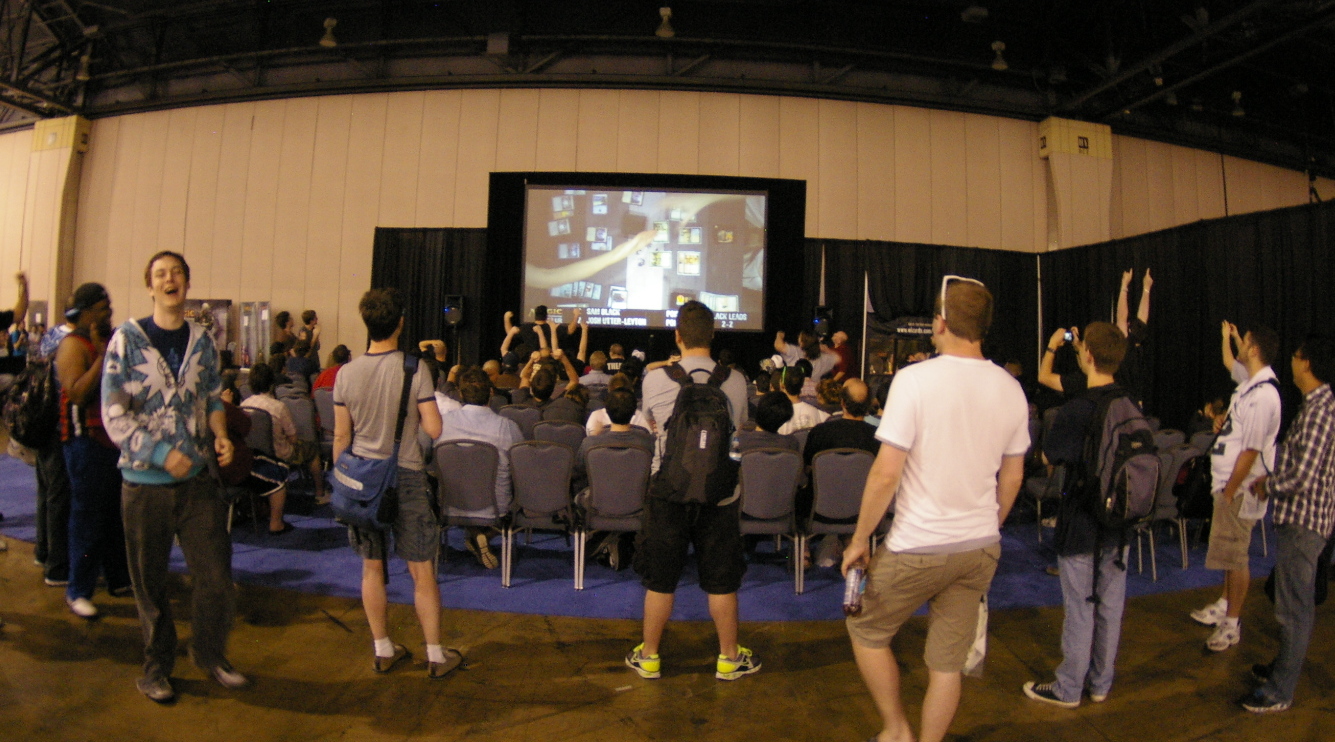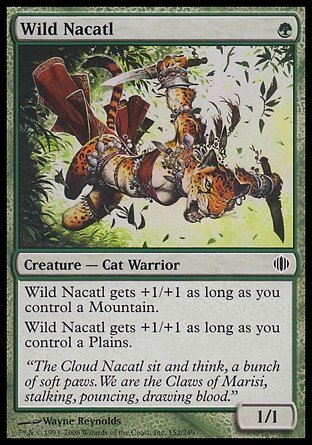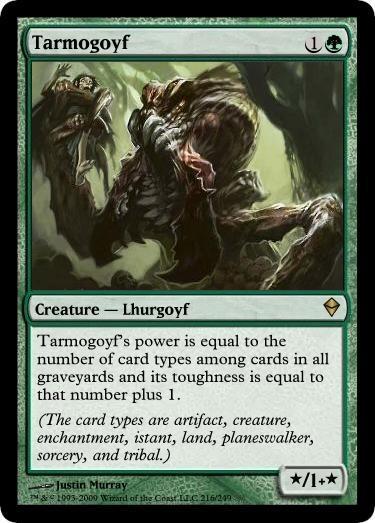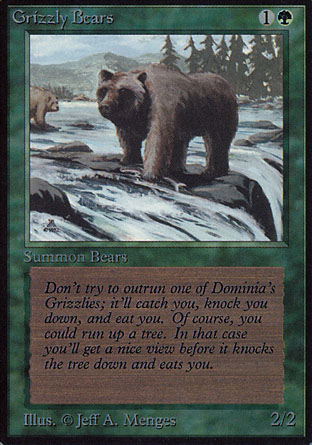Magic The Gathering as Literature, part 3: The Vocabulary

Players react as Josh Utter-Leyton defeats Sam Black in the semifinals.
It’s day three of Pro Tour Philadelphia, and the final (“Top 8”) competition is underway. This part of the tournament is webcast (you can watch it live here), and is also being transcribed. (Since this is such high level play, players will want to read descriptions of what, precisely, happened on each turn; this is what Bill Stark was doing in the photo at the top of Part 2.)
These match transcriptions often read like a foreign language to non-players. For example, here’s an excerpt from a write-up of a match played yesterday between Jeremy Neeman and Luis Scott-Vargas:
Since he couldn’t storm, Neeman simply played a copy of Empty the Warrens to get two Goblins, neither of which were nearly as large as the 3/4 Tarmogoyf that kept crashing in. Scott-Vargas then used his one spell to Green Sun’s Zenith for a Wild Nacatl powered up by Sacred Foundry. (Blake Rasmussen)
Got that? In order to make sense of that passage, you have to know:
- What the cards are (“Who is this Wild Nacatl?”);
- How they work (“Why should this uncivilized Nacatl be ‘powered’ up by a Sacred Foundry?”);
- What the players are trying to achieve (“Why does Neeman want to ‘storm’?”);
- The slang that’s used to describe those interactions (“What is this ‘crashing in’ that Tarmogoyf keeps doing?”).
Playing, let alone mastering the game requires being able to understand a vast amount of vocabulary: card names, rules terms, keywords, and slang. Some of it can be looked up—here’s a database of cards, for example, and here are all the game rules—but whatever’s left is picked up by osmosis: you go to a game shop and hear how players talk, and soon your own Tarmogoyf is “crashing in,” rather than “attacking.”
Osmosis was the approach I took several years ago when I tried teaching my then-girlfriend how to play: I gave her a deck and let her do what she thought the cards did. (The game’s Rules Manager, Matt Tabak, told me that Wizards of the Coast conducts focus testing along these lines, partly to see if the cards make sense, but partly to measure non-players’ intuitions.) We played a lot of matches where her Grizzly Bears hid in the Forest from my White Knight, then sneaked over to my side to smash my Ivory Cup.)
She also tried to make sense of Pro Tour match write-ups, albeit with less success. But it wasn’t a total wash. Mesmerized by how little of the language she understood, she began writing imitations of the coverage. Here, published for the first time, are Michelle Tupko’s “Magic Poems”:
1.
Compulsive Research dug up a Hallowed Fountain, and then Triskavelus a turn later made it look like Ogura had finally escaped from the bring of disaster – until he made a mistake. He doesn’t have enough dragons. But he’s going to get a Permanent Researcher, and dig up a province, and fill it up with Ascetic Trolls.
2.
The cat will be tapped into eternity. The cat will be fetched up to the land by a ghoul.
3.
Gisparic was down 15 Life and was quickly losing Land, but when he tapped out an Ascetic Troll and tore out a Big Lostodon, it was a slap in the face to Zidek. Then it was one to the Monkey, one to the Dog Star, and two to the face, with a smash from the Elephant. Gisparic finally phoned in with a Wild Researcher, but it wasn’t quite enough for Zidek’s Essentially Destructive Force, which hit the ground running with a Bloody Fairy to boot. Zidek couldn’t hold him back with a Octagon Spell or a Charismatic Goblin, so he revived an Eccentric from the Graveyard, who put an end to everything. Zidek crumbled, taking his Dark Dawn and horde of Master Mongrels with him.
4.
Put three jellyfish in your mana, then stick it in your graveyard where horrible existence is.
As Viktor Shklovsky put it, “the language of poetry may be said to be a difficult, ‘laborious,’ impeding language.” The Magic poetry of the future is waiting to be written!
Tags: Bill Stark, Blake Rasmussen, Jeremy Neeman, Josh Utter-Leyton, Luis Scott-Vargas, magic the gathering, Matt Tabak, Michelle Tupko, poetry, Pro Tour, Sam Black, slang, Viktor Shklovsky, Wizards of the Coast




was just thinking earlier today about the card Time Walk and the way it’s used now as slang for certain good plays, e.g. Remand in the early game is essentially a self-replacing Time Walk against decks that want to tap out turn 2, 3, or 4. anyway someone mentioned the play and that it was a good way to time walk your opponent, which is such a great turn of phrase and Time Walk is a good card name too. the whole thing is so good that a few weeks ago I used Time Walk as the title of a poem.
I want to be the editor of the eventual Norton Anthology of Magic Poetry!
It occurred to me not too long ago, that MTG cards would be a good “prompt” for fantasy writing ideation. I don’t know about sets after the millennium but, for example, cards from “Revised” (classic cards, in my opinion…not side sets) included great little witticisms in the text. The “Legends” set featured cards with an actual basis in reality, that is, real mythology. If I was looking to get started writing fantasy literature I would definitely take a look at these cards as a potential resource.
[…] Part 1 | Part 3 […]
I would think even the newest sets are worth pluming for inspiration, if not outright stealing. Revised and Legends and all those oldschool sets certainly had more connection to reality–some of them even quoted Shakespeare. But with all the planes and realms that the new ones have brought about–every set introduces new planeswalkers, places, details about the world and events within it–I feel like that stuff is perfect for starting your own work too because it’s already at a remove from “reality”.
Guess this means I’ll have to start writing my Zedruu the Greathearted story now.
Great posts, by the way. I have a trade binder and a Commander deck sitting on my desk next to me, begging me to stop writing and go play.
Great posts, by the way. I have a trade binder and a Commander deck sitting on my desk next to me, begging me to stop writing and go play.
Great posts, by the way. I have a trade binder and a Commander deck sitting on my desk next to me, begging me to stop writing and go play.
Great posts, by the way. I have a trade binder and a Commander deck sitting on my desk next to me, begging me to stop writing and go play.
Great posts, by the way. I have a trade binder and a Commander deck sitting on my desk next to me, begging me to stop writing and go play.
Great posts, by the way. I have a trade binder and a Commander deck sitting on my desk next to me, begging me to stop writing and go play.
Every time I read one of these articles I spend hours trying to catch up with the game, but it’s futile. One of the things that’s potentially appealing about the game’s culture to me, and game subcultures in general, is that they are (or have the appearance of being) small enough to master, in the way that something like “contemporary poetry” never will be. The cards are a closed system, the competitive structure defines whose work is “significant,” but after paying minimal attention to the game for a number of years, it’s just too much to take in in anything like a reasonable amount of time.
How much, if at all, do you yourself play, Adam?
Hi EMH,
I played from 94–98, or so—Fallen Empires through Mirage. Since then, I’ve hardly ever played, though I still know how to. I’m terrible, though. Mainly I follow the game, reading articles and watching videos, and following the Pro Tour. My primary interest is in the game’s design, and in the theory underlying it. As well as in watching what folks then do with the cards, and the philosophies underlying that.
A good friend who does play once said I’m quite possibly the world’s most knowledgeable person about Magic who doesn’t ever play. I suspect, though, there are more like me out there.
Do you play?
Cheers,
Adam
Totally! The Magic version of The Castle of Crossed Destinies is awaiting its author…
[…] the Gathering as Literature,” Part 1, Part 2, & Part 3 (written at Pro Tour Philadelphia […]